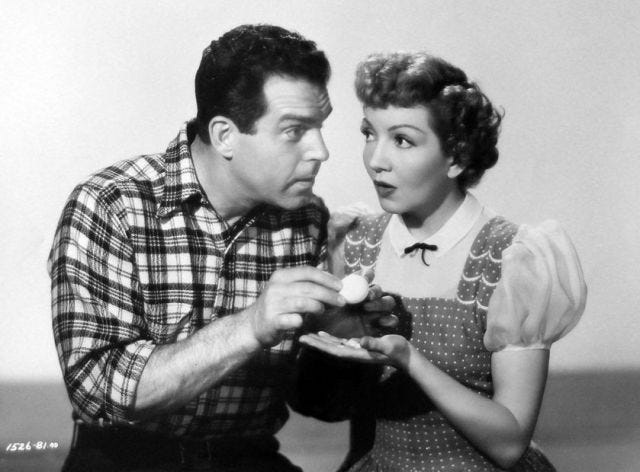So What, Who Cares (vol 1, issue 16) What beacons are and how they'll shape your shopping
Last year, Apple quietly rolled out a technology that will give us all The Minority Report shopping experience: iBeacons. An iBeacon is a "froot loop," i.e. a brand name for a concept-product, and in this case the concept-product behind the iBeacon is a software-hardware combo that requires two separate technology entities. The first entity: Your iPhone, with its Bluetooth-enabled wireless networking capability and unique user ID. The second entity: a beacon, which is a small wireless sensor that detects when another device is nearby and transmits information to it. What's the point? To use a data point -- i.e. a specific user at a specific location -- in a way that allows the business to streamline its operation in some way.
The dream of ubiquitous, low-frequency networking as a force for customer-facing transactions has been around for a while, but beacons are expected to succeed where RFID technology failed for one simple reason: Instead of asking businesses to build up new infrastructure and ask customers to buy into it (a la the CueCat), the Beacon works off a technology that is already near-ubiquitous among consumers, that they pay for themselves.
All retailers have to do is persuade customers to download their apps, and then the retailers can push offers to smartphone users the moment they darken the shop door. The apps don't even have to be on, thanks to Apple quietly tweaking settings to allow marketing apps to track your location even when they're off.
Currently, Apple's known for having used beacons in its store for the last year, but Macy's just announced that they're rolling out retail's largest beacon deployment, just in time for the holidays. No word whether Macy's celebrity endorsers like Martha Stewart and Donald Trump will be shouting at you to buy sheets during Black Friday.
In fairness, location awareness can also be used for good: one suggested use for the iBeacon technology is as a way to expedite security lines at airports and identify passengers who are likely to miss flights.
So what? You have a phone that is telling other friendly machines who you are and where you are. You're not moving anonymously through public spaces anymore.
Who cares? One thing to consider: If special offers are beamed only to the people who have cheerfully ceded some privacy and/or have a smartphone, stores are effectively putting prices on privacy and levying a subtle economic penalty against those who are unable to afford a smartphone in the first place.
*

Before you succumb to the temptation to drop off the grid and live off the land, be warned: farming is an expensive hobby and it's terribly boring, high-risk work. I could have told you this after reading Betty Macdonald's sublime The Egg and I, or Josh Kilmer-Purcell's breezy memoir, The Bucolic Plague, which details his decision to buy a crumbling mansion and turn it into an organic farm-cum-goat refuge. (Don't weep for Kilmer-Purcell: He and his adorable, type-A husband went on to win the Amazing Race and launch a high-profile lifestyle brand with Beekman 1802.) #
But now, actual experts will tell you this too. One farmer explains that access to land and access to capital can make or break a would-be son of the soil. There's also the issue of how to acquire the skills and technical knowledge it takes to run a successful farm: if you're not born to the life, you've got to find a way to acquire both the physical skills and the knowledge it takes to keep the concern going.
So what? Farming has acquired a patina of glamor over the last decade or so, as people begin to fetishize the origins of their food and long to reclaim some personal agency in the chain of production. The reality is less self-actualizing. It may actually be socially problematic, since it's only recently come to people's attention that most of the folks doing the hard, low-paying labor in urban farming are women.
Who cares? This is a great story about how the food production chain is still not clear enough to most modern consumers: We have no idea what it takes to grow our food, how the work is done or what knowledge people need.
# One pop-culture note: I have a well-established fascination with books where people attempt to live off what they can grow in their back yard.
*
Two final pop-culture notes: First, go read the Economist's obituary for Joan Rivers, which has one of the most novel framing devices I've seen in that publication. Then go read the interview with Ann Wroe, the Economist's obituary writer and the number one reason to read the magazine's back page every week.
Second, last Friday, I got fall TV previews from both Entertainment Weekly and US Weekly. One thing struck me as notable: US Weekly's listings for new shows on the schedule included information on where new episodes would be streaming. I find it fascinating that a gossip rag is in tune with demographic shifts and the rise of streaming TV as a viable option and the ostensible entertainment rag is not.
*
Will you be streaming TV this fall? Or will you be testing your iPhone at pumpkin farms to see if beacon technology has made it to the U-pick market yet? Tell me via email or Twitter. If you really like this email, tell a friend to subscribe.

